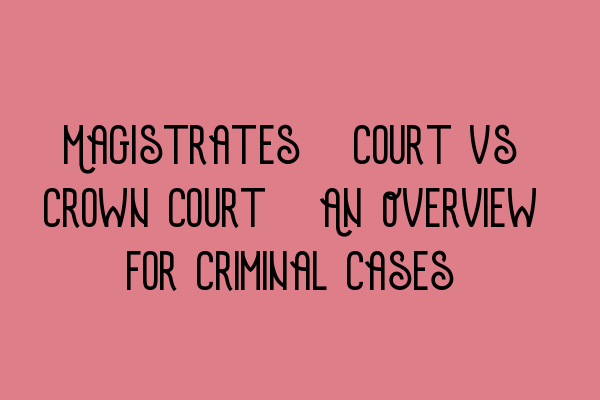Magistrates’ Court vs Crown Court: An Overview for Criminal Cases
When it comes to handling criminal cases in the United Kingdom, two key legal institutions come to the forefront: Magistrates’ Court and Crown Court. Each of these courts plays a vital role in the criminal justice system, but understanding their differences can be crucial when facing criminal charges or seeking legal advice. In this article, we provide an overview of the Magistrates’ Court and the Crown Court and explore their roles, procedures, and key features.
Magistrates’ Court
The Magistrates’ Court is the lower court in the UK’s hierarchical criminal justice system. It hears the majority of criminal cases and has a wide jurisdiction for dealing with various offences, including less serious crimes such as minor theft, driving offenses, and public order offenses.
The Magistrates’ Court is presided over by either a District Judge or a panel of three Magistrates, known as Justices of the Peace. These Magistrates are not legally qualified but are trained to adjudicate on cases based on legal principles.
This court is the first point of entry for most cases, and it focuses on ensuring a fair and efficient trial process. The Magistrates’ Court handles many aspects of criminal cases, such as preliminary hearings, bail applications, and sentencing for minor offenses. For more serious offenses, it may conduct trials to ascertain guilt or innocence, but any sentencing power is limited. For complex cases, the Magistrates’ Court may transfer them to the Crown Court.
If you are preparing for the SQE 1 exam, it’s essential to have a solid understanding of court procedures. You can test your knowledge with SQE 1 practice exam questions or improve your skills with practice mocks FLK1 FLK2.
Crown Court
The Crown Court in the UK is the superior court in the criminal justice system and handles more serious criminal cases. It has jurisdiction over indictable offenses, such as murder, rape, drug offenses, and serious fraud. The Crown Court also hears appeals from the Magistrates’ Court.
Cases in the Crown Court are usually heard before a Judge and a jury, ensuring a fair and independent trial. The jury is responsible for determining guilt or innocence based on the evidence presented. The Judge oversees the proceedings, provides legal guidance, and ultimately pronounces the sentence if a conviction is reached.
In the Crown Court, barristers and solicitors with higher rights of audience can represent clients and present their case. These legal professionals have in-depth knowledge and experience in dealing with complex criminal matters.
If you are aiming to become a criminal lawyer and are preparing for the SQE exams, enrolling in SQE 2 preparation courses can provide you with the necessary knowledge and skills to succeed in your career.
Choosing the Right Court for Your Case
When facing criminal charges, understanding whether your case will be heard in the Magistrates’ Court or the Crown Court is crucial. It often depends on the complexity and seriousness of the offense, as well as personal circumstances.
In general, less serious offenses are dealt with in the Magistrates’ Court, while the Crown Court handles cases that require a more extensive examination of evidence or involve more severe penalties. The decision on whether a case goes to the Magistrates’ Court or Crown Court ultimately lies with the CPS (Crown Prosecution Service) in consultation with legal representatives.
Being aware of the differences between the two courts can help you make informed decisions and understand the criminal justice process better. Whether you are a defendant, a legal professional, or simply interested in the legal system, knowing the distinctions can be valuable.
Stay updated with the latest SRA SQE exam dates and important information to plan your legal career by checking out the comprehensive list of SRA SQE exam dates.
In conclusion, Magistrates’ Court and Crown Court are both important components of the criminal justice system in the UK. They have their distinct roles, procedures, and responsibilities. Understanding these differences will allow defendants, legal professionals, and those studying for the SQE exams to navigate the legal landscape more effectively.
For comprehensive SQE 1 preparation courses or SQE 2 preparation courses, SQE 1 practice exam questions, and practice mocks FLK1 FLK2, visit https://fqps.co.uk/sqe/sqe1-preparation and https://fqps.co.uk/sqe/sqe2-preparation.
